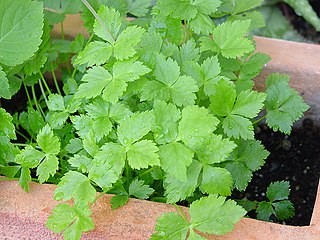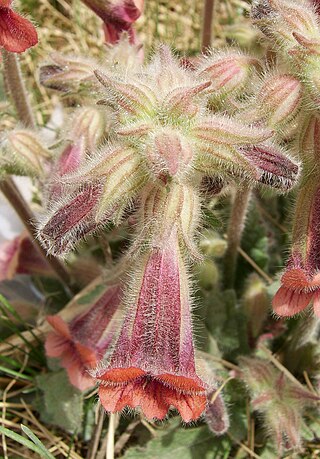
Lonicera japonica, known as Japanese honeysuckle and golden-and-silver honeysuckle, is a species of honeysuckle native to eastern Asia, including many parts of China. It is often grown as an ornamental plant, but has become an invasive species in a number of countries. Japanese honeysuckle is used in traditional Chinese medicine.

The loquat is a large evergreen shrub or tree grown commercially for its orange fruit and for its leaves, which are used to make herbal tea. It is also cultivated as an ornamental plant.

Cryptotaenia, or honewort, is a genus of herbaceous perennial plants, native to North America, Africa, and eastern Asia, growing wild in moist, shady places.

Rehmannia is a genus of seven species of flowering plants in the order Lamiales and family Orobanchaceae, endemic to China. It has been placed as the only member of the monotypic tribe Rehmannieae, but molecular phylogenetic studies suggest that it forms a clade with Triaenophora. Contrary to the immense majority of the taxa of Orobanchaceae, Rehmannia is not parasitic.

Ulmus changii, occasionally known as the Hangzhou elm, is a small deciduous tree found across much of China in forests at elevations of up to 1800 m. Owing to its increasing scarcity, U. changii was added to the Hainan Province Protected Plants List in 2006.

Ulmus lanceifoliaRoxburgh, ex Wall., occasionally known as the Vietnam elm, is a very large tree endemic to a wide area of southern Asia. Its range extends southeast and eastwards from Darjeeling in the Himalaya, through Bangladesh, southern China, Myanmar, Thailand, Laos, Vietnam and on discontinuously into Indonesia, straddling the Equator in Sumatra and Celebes.
Ulmus davidiana var. davidiana is variety of elm. The tree is restricted to the Chinese provinces of Hebei, Henan, Shaanxi and Shanxi.

Pogonia japonica, known as Asian pogonia, is a species of orchid occurring in East Asia.
C. japonica may refer to:

Justicia japonica is a flowering plant species in the genus Justicia.

Dioscorea japonica, known as East Asian mountain yam, yamaimo, or Japanese mountain yam, is a type of yam (Dioscorea) native to Japan, Korea, China, Taiwan, and Assam.

Blyxa is a genus of an aquatic plant of the family Hydrocharitaceae described as a genus in 1806.
Strobilanthes japonica is a flowering herbaceous perennial plant from Asia, one of around 350 plants of the genus Strobilanthes. The 20–50 cm ornamental plant is cultivated in Japan and China, and blooms in autumn with 1.5 cm purple to white funnel-shaped flowers.

Pogonia is a genus of orchids belonging to the subfamily Vanilloideae.
Balanophora japonica is a plant species in the genus Balanophora found in Japan.

Najas gracillima, the slender waternymph, is a submerged species of aquatic plant in the Hydrocharitaceae family. found in lakes and streams. It is native to China, Russian Far East, Japan, Korea, Taiwan, Iran, Alberta, Ontario, Newfoundland, Nova Scotia, New Brunswick, the eastern United States. It is also considered introduced and naturalized in France, Spain, Italy and California.

Barnardia japonica, the Japanese jacinth, is a bulbous flowering plant in the family Asparagaceae, subfamily Scilloideae. It is one of the two species of the genus Barnardia, found in east China, Korea, Japan, Taiwan and East Russia.

Alnus japonica, known as Japanese alder, is a species of Alnus from Japan, Korea, Taiwan, eastern China, and Russia.

Helwingia japonica, the Japanese helwingia, is a species of flowering plant the family Helwingiaceae. It is native to South-East Asia.

Artemisia japonica, commonly known as the Japanese wormwood or the Oriental wormwood, is a species of wormwood in the family Asteraceae that is native to Japan, Korea, China, Southeast Asia, and the Indian Subcontinent. Its common name in Japanese is オトコヨモギ, 牡蓬, or otoko yomogi meaning male mugwort in English.















